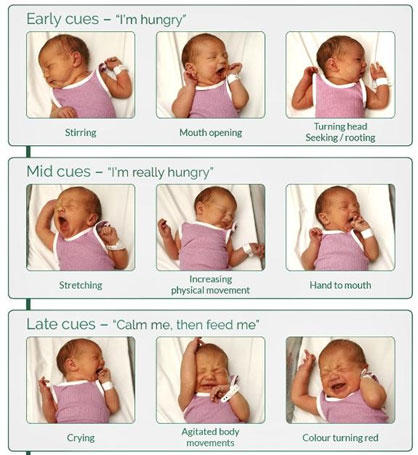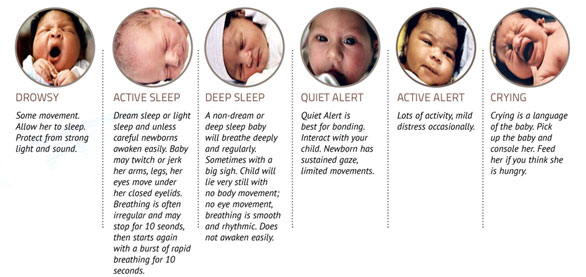Breastfeeding

- New-borns have a very powerful sense of smell and they can recognize their mother’s own breast milk
- How often babies breastfeed Roughly, a newborn should be fed a minimum of 8 times a day during the initial weeks.
- In the first few days, mothers might produce milk as low as 5 ml (1 teaspoon) at each feeding, but by the 4th to 5th day the volume goes up to 20-30 ml.
- Babies can be fed whenever they feel hungry or when the mother experiences the fullness of the breasts. Overfeeding a baby that is exclusively on breast milk is not possible.
- Breastfed babies generally feed more frequently than bottle-fed babies. This does not mean that the child is not getting enough milk each time. The best feeding schedule is what the baby designs for herself.
- Babies have different feeding styles – one might take to breastfeeding immediately while another might take some time. A little patience will go a long way towards understanding what babies want.
Feeding Cues

How to Know If My Baby Has Taken Adequate Feeds?
- Sleeps well after feeding for at least 1-2 hours.
- Baby’s urine output gives a clue. On the first day, the baby passes urine once or twice but after 4 days, he/she passes 6 or more times, which ensures the baby has taken a good amount of feed.
- Breasts that had a heavier feel before feeding will feel lighter after feeding.
Babies’ face/expression gives cues to understanding them.

Regurgitation/Posseting

Most of the babies bring out a small amount (teaspoonful) of milk effortlessly after feeding. This is considered to be normal. But forceful vomiting of large amount of milk or greenish content is not normal.
Urine & Stool
Almost all normal babies pass urine within 24 hours of birth and pass stools within 48 hours of birth. If not done, the baby should be evaluated for the reason behind it.
Urine – After the initial 4 days, babies pass urine 6-8 times a day but some may pass 12-15 times a day or even more.
It is normal for newborns to cry before passing urine. The stretching of the bladder causes an abnormal sensation making them cry. Once the bladder empties, they become calm.
Stool – Some babies, especially breastfed, may pass a small amount of semi-solid stool after every feed as the baby’s full stomach stimulates the digestive tract and urges to pass stools.
Some babies may pass stool as occasionally as once in 4-6 days. If there are no other symptoms, this reduced frequency is not a cause for concern.
On Days 1-2

Poos once or twice a day. At this stage, it is called meconium. It’s very dark green/brown/black and sticky and it’s already in the bowel at the time of birth.
On Days 3-4

Poos two or more times a day and the colour looks more green.
On Days 5-6

Passes soft yellow poo 1-2 times a day.
Hiccups, Sneezing
It is normal for a newborn to have hiccups and a few sneezes in a day.
Cry
It is the only way the baby communicates with the surroundings. Do listen to your baby’s different cries and you will understand what he/she is trying to convey.
- – Hungry: Most common reason.
- – Angry: Check for wet nappies, very cold/hot environment, diaper rash, hair around a finger.
- – Lonely: Baby needs human comfort, and rocking movements.
- – Bloaty: This may be because of overfeeding and bloating of the stomach. Burping after each feed helps to solve this.
- – Sleepy: Provide a quiet environment to sleep.
Sleep
- – Babies do not follow any sleep routine initially and sleep for 8-9 hours, both during the day and night. They have reduced sleep cycles and usually wake up every 40 minutes.
- – Parents should put their babies to sleep when the baby shows signs like yawning, fussing, etc. The right environment will help the baby sleep comfortably.
- – Usually, they wake up for feeds every 2-4 hours and sleep again.
- – Most babies develop a set pattern of sleep and wakefulness by 3-4 months.

Dr. D. Sivaraman
Associate Consultant – Paediatrics & Intensive Care Specialist
Kauvery Hospital Chennai

